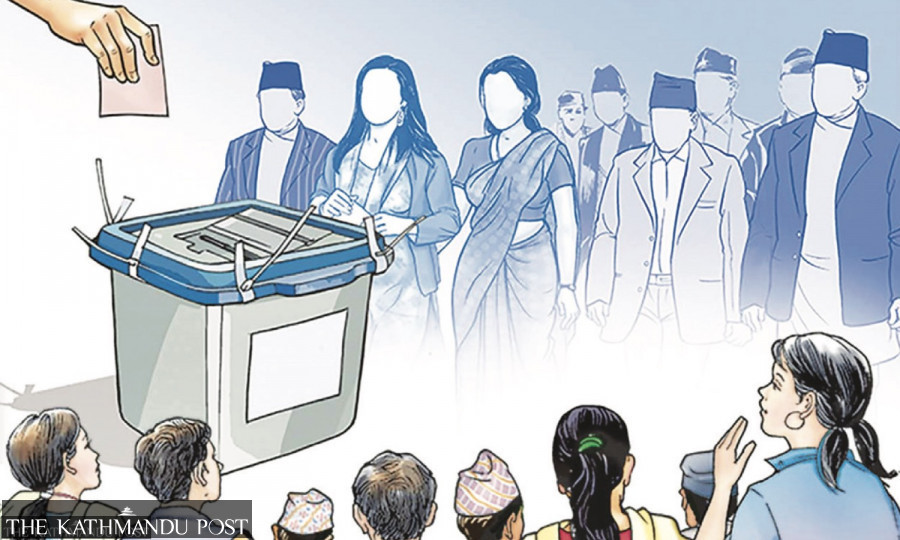National
Thousands of eligible citizens outside constituencies denied voting rights
The election commission should have come up with an arrangement to allow eligible voters based anywhere within the country to vote, experts say.
Post Report
The Patan Hospital administration deployed Dr Aashis Bhandari at its emergency department for Saturday night.
Bhandari, a local from Pokhara-Lekhnath Metropolitan City, said that he wants to vote in the parliamentary and provincial assembly elections being held on Sunday.
“I have to perform night duty on Saturday and vehicles are not being allowed to run on the election day,” Bhandari told the Post on Saturday afternoon. “Due to the nature of my profession, I am deprived of my voting rights.”
Like Bhandari, thousands of eligible voters engaged in various professions—such as banking, medicine, teaching, journalism and various other informal sectors—will not be voting in the general election despite being in the country. People like Bhandari bound by their professional duties and thousands of other eligible voters who are outside the country will be deprived of their right to exercise franchise.
The government, however, has devised a mechanism for 450,000 election officials, including security personnel, civil servants, teachers and temporary police, to cast their vote. They can vote in the same centres they are deployed in but only under the proportional representation system.
Altogether 141 separate temporary voting booths have been arranged in the centres for the purpose. Also, inmates across the country are included in this category and similar arrangements are made at the prisons.
“Yes, hundreds of thousands of people working or studying within the country are being deprived of their right to vote in every election and all the concerned agencies, including the Election Commission, are aware of this,” said Ayodhi Prasad Yadav, former Chief Election Commissioner. “And these people are being deprived of their rights because there appears to be no immediate solution to the issue. The major reason is that the concerned agencies aren’t serious about it.”
And, this is not the first time that so many people will be deprived of their voting rights in the elections.
Ramesh Pudasaini, a local from Belkotgadhi Municipality-2 in Nuwakot, had gone to his village during the local level elections, but this time, he couldn’t manage it.
“I have been preparing for the Public Service Commission’s exams for years and this time the exam has been scheduled immediately after the elections,” Pudasaini, 28, said.
Experts say neither the election commission nor the political parties have taken the matter seriously.
“It is not that I am not interested in choosing my representatives. I am quite interested, but my circumstances do not allow me to go to the village, where I am enrolled in the voters’ list,” said Sita Gharti, a 29-year-old native of Nepalgunj who runs a grocery shop at Tarakeswar in Kathmandu.
Apart from people involved in various professions, elderly people residing in cities with their family members, ailing people admitted to hospitals and their visitors, those working in informal sectors such as construction sites, drivers and others serving in private institutions will not be able to cast their votes.
“I would like to cast my vote in Sunday’s election, but I cannot return to my home constituency as my son did not get leave from his office for the elections,” said Rishiram Poudel, 84, from Chitwan-2. “The concerned authorities such as the Election Commission should take serious initiatives to make arrangements of voting for people like us.”
According to Poudel, his son and daughter-in-law will also be deprived of their voting rights.
“Of the 16 members in my family, only I will be going to my village to vote,” said Bikas Thapa, who is from Dhading but currently lives at Tarakeswar-4 in Kathmandu. “We will be deprived of our voting rights and the political parties too will not get our votes. It is also a loss for them.”
Yadav, the former chief election commissioner, said the Election Commission had five years to make arrangements for people like Thapa and Poudel to vote. Yadav added the Election Commission could have learned from the practice in various countries around the world that have ensured voting rights to people staying both in and out of their home constituencies.
“Even if it is difficult to make the arrangements for the first-past-the-post electoral system, the commission could have given the rights to cast vote under the proportional representation system wherever the voters are based,” Yadav said. “The commission could have introduced early voting, postal voting and online voting.”




 8.79°C Kathmandu
8.79°C Kathmandu














